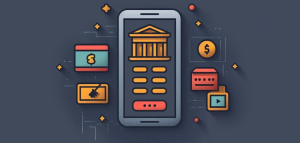With the rapid evolution of financial technology, digital banking has become an attractive alternative to traditional banking. Whether you are tech-savvy or simply looking for an easier way to manage your money, evaluating the benefits and challenges of digital bank accounts will help you make the best choice for your financial needs.
Anúncios
One of the primary advantages of digital banking is the flexibility it offers. Consumers can access their accounts 24/7 from virtually anywhere, eliminating the need to visit a physical branch. This is especially beneficial for individuals who travel frequently or live in areas without convenient access to traditional banks. Additionally, many digital banks provide intuitive mobile apps that allow users to monitor their spending, transfer funds, and set up automated payments with ease.
Another key benefit is the cost savings associated with digital banking. Many online banks operate with lower overhead costs than brick-and-mortar institutions, allowing them to offer competitive interest rates, fewer fees, and higher rewards. This can translate into significant financial benefits for account holders, especially those who want to maximize their savings or avoid costly maintenance fees.
The Advantages of Digital Banking

One of the primary reasons people switch to digital bank accounts is convenience. Unlike traditional banks, which require in-person visits to branches, digital banks allow you to access your funds, pay bills, transfer money, and manage your financial transactions from anywhere in the world, using just a smartphone or computer.
Many digital banks also provide user-friendly mobile apps that streamline banking tasks. These apps often include features such as:
- Mobile check deposits
- Automatic bill payments
- Real-time notifications for transactions
- Spending categorization and budgeting tools
This level of accessibility ensures that customers have complete control over their finances 24/7, without the need to visit a physical branch.
2. Lower Fees and Cost Savings
Traditional banks often charge a variety of fees, including monthly maintenance fees, overdraft fees, ATM withdrawal fees, and even charges for insufficient funds. Digital banks, on the other hand, operate with lower overhead costs due to the absence of physical branches. This allows them to pass on the savings to customers by offering:
- No monthly maintenance fees
- Free or reduced-cost ATM access
- No minimum balance requirements
- Lower international transaction fees
These cost-saving advantages make digital banking a financially smart option for consumers who want to avoid unnecessary fees and maximize their savings.
3. A Wide Range of Financial Services
Digital banks are not just limited to basic checking and savings accounts. Many offer a comprehensive range of financial services, including:
- High-yield savings accounts
- Investment opportunities (stocks, cryptocurrency, and ETFs)
- Personal and business loans
- Credit-building tools
- Retirement account options
Additionally, some digital banks partner with financial technology (fintech) firms to provide innovative services, such as AI-driven financial planning and automated investment strategies. These integrations help customers take a more holistic approach to their personal finance management.
4. Real-Time Transaction Monitoring and Enhanced Security
Another significant benefit of digital banks is real-time transaction tracking. Unlike traditional banks that update balances at the end of the day, digital banks provide immediate updates on transactions, making it easier to monitor spending and detect potential fraudulent activities.
Most digital banks also offer advanced security features such as:
- Multi-factor authentication (MFA)
- Biometric logins (fingerprint and facial recognition)
- Instant transaction alerts
- AI-powered fraud detection systems
These security measures help protect users from cyber threats and unauthorized access to their accounts.
The Challenges of Digital Banking
1. Lack of Physical Branches
While digital banks offer unparalleled convenience, they do not have physical branch locations. This can be a disadvantage for individuals who prefer face-to-face interactions when handling complex financial matters, such as applying for a mortgage or disputing a charge.
For those who rely on cash transactions, the lack of a physical branch network can also pose a challenge. Some digital banks provide ATM deposit options, but cash deposit availability varies depending on the institution.
2. Dependence on Technology
Digital banking requires a stable internet connection and a compatible device. This reliance on technology means that users who experience technical issues, such as a lost phone, software malfunctions, or service outages, might face difficulties accessing their funds.
Furthermore, customers who are not tech-savvy may struggle with navigating mobile apps and online platforms, making digital banking less appealing for certain demographics, such as elderly individuals.
3. Cybersecurity Risks and Fraud Concerns
Despite stringent security measures, digital banks remain susceptible to cyber threats such as hacking, phishing attacks, and identity theft. Customers must take proactive steps to protect their accounts by:
- Using strong, unique passwords
- Enabling multi-factor authentication
- Avoiding suspicious emails and links
- Regularly monitoring account activity for unauthorized transactions
Although digital banks invest heavily in security infrastructure, the risk of fraud and cyber-attacks is an ongoing concern that customers should be aware of.
4. Limited Cash Handling Options
Traditional banks allow customers to deposit and withdraw cash easily at local branches. Digital banks, however, typically rely on ATM networks for cash-related transactions, which can be inconvenient for users who frequently handle cash.
Some digital banks partner with major ATM networks to provide cash access without fees, while others may impose restrictions or charges on ATM withdrawals. Additionally, mobile check deposit features, while useful, may involve longer processing times compared to in-person deposits at traditional banks.
Conclusion
Digital bank accounts offer a modern and convenient way to manage finances, providing benefits such as accessibility, lower fees, real-time transaction tracking, and an extensive range of financial services. However, they also come with challenges, including limited physical branches, dependence on technology, and potential cybersecurity risks.
When deciding whether digital banking is the right choice for you, consider your financial habits, security concerns, and the importance of in-person banking services. If you prioritize convenience, cost savings, and tech-driven financial management, digital banks can be an excellent solution. However, if you rely on in-person support or frequently handle cash transactions, a traditional bank might still be a better fit.
As financial technology continues to advance, the banking industry will likely see further innovations, improving digital banking experiences while addressing current limitations. Regardless of your choice, staying informed and practicing safe banking habits will ensure you make the most of your financial journey.ess straightforward compared to traditional banks. Although many digital banks offer mobile check deposit features, the clearing times may differ, and the lack of physical branch support could be inconvenient in certain cases.






